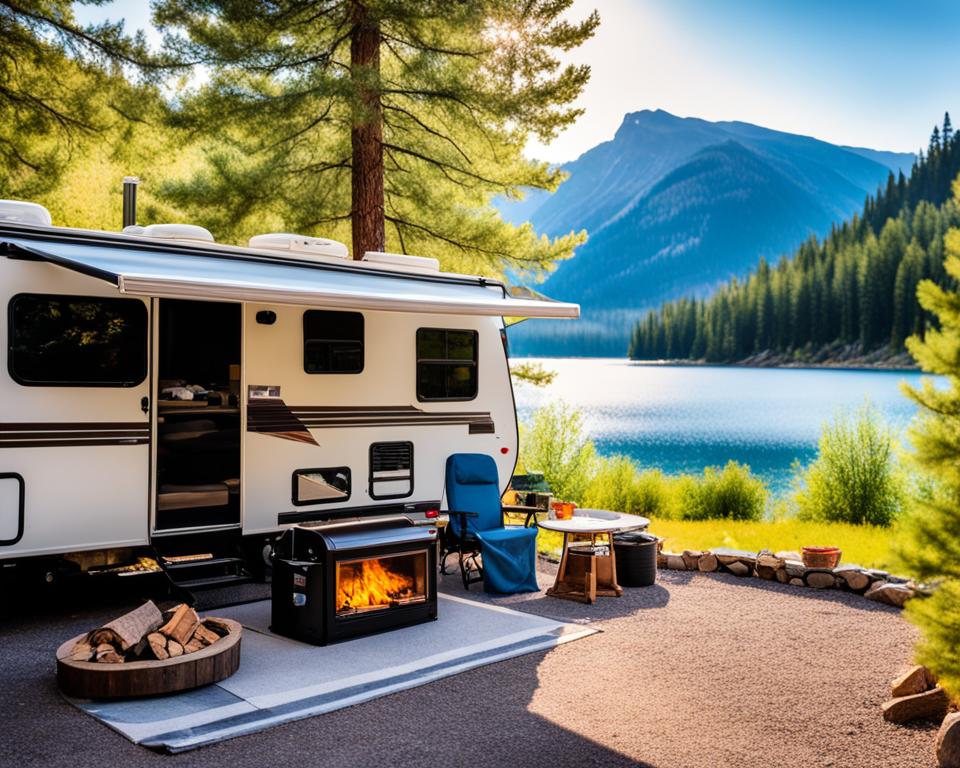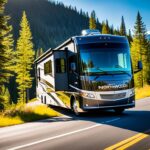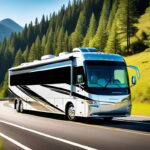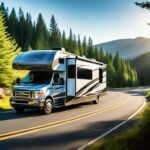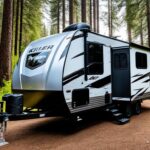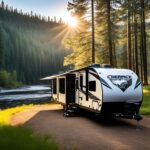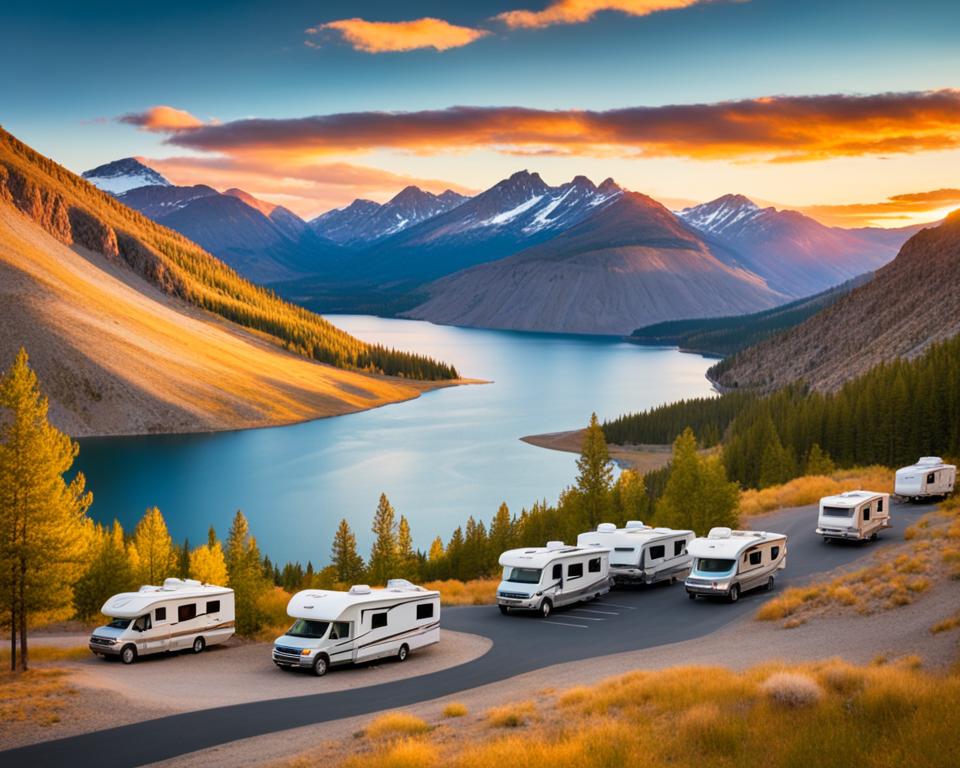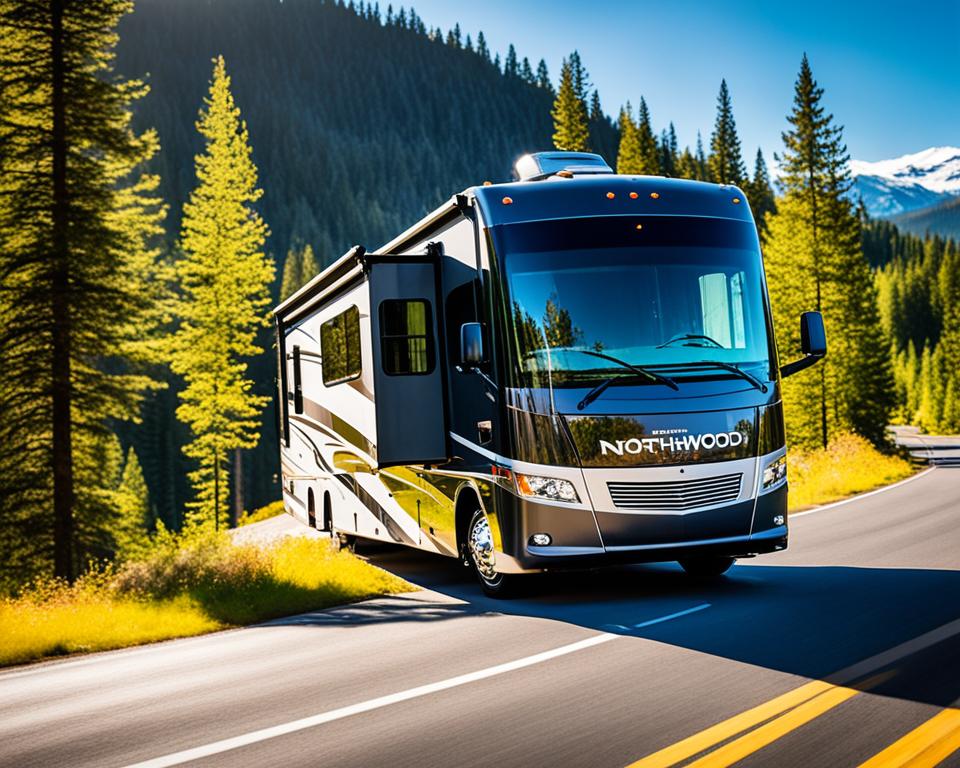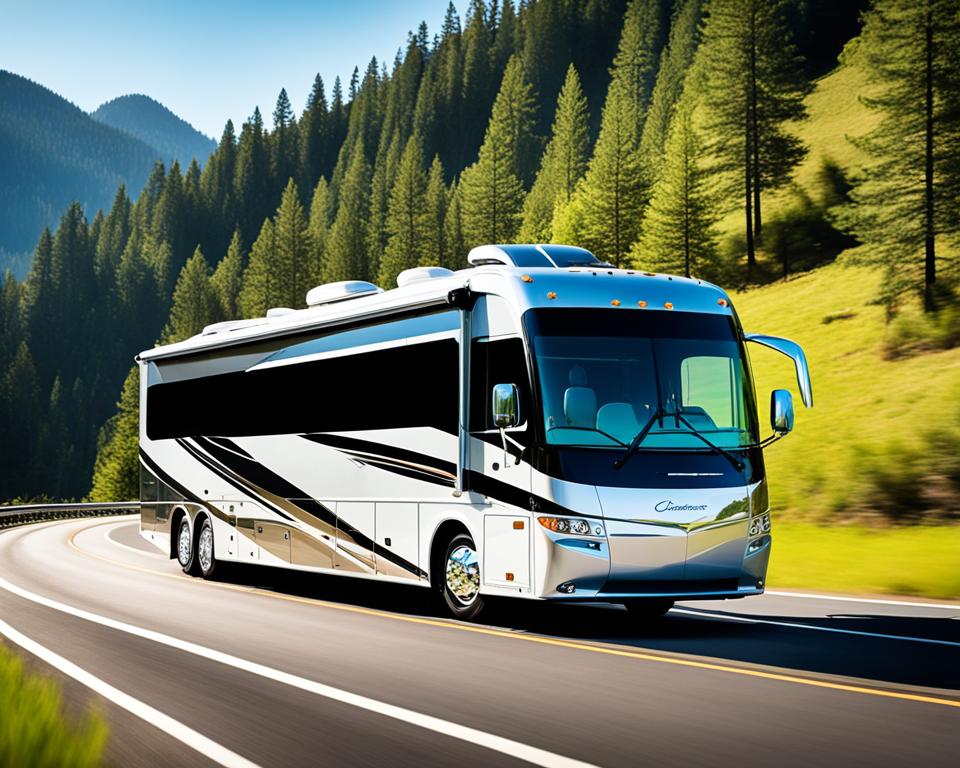Full-time RV living has become increasingly popular in recent years due to the desire for freedom and the ability to work remotely. Many people are finding value in letting go of possessions and embracing experiences. Transitioning to full-time RV living can be a life-changing adventure.
Key Takeaways:
- Make sure to choose the right RV for your needs
- Downsize your belongings to maximize space
- Establish a legal address and obtain necessary documents
- Create a budget for living expenses
- Find work opportunities that allow for remote work or flexibility
Why Choose Full-Time RV Living?
Full-time RV living offers a multitude of benefits that appeal to adventurers seeking a more flexible and adventurous lifestyle. It provides the freedom to explore new places, work remotely, and embrace the open road. However, it’s important to avoid some common mistakes that can hinder the transition to full-time RV living. Let’s take a closer look at the reasons to choose this lifestyle and the pitfalls to avoid.
One of the primary advantages of full-time RV living is the sense of freedom it brings. No longer tied down to a specific location, you have the ability to travel wherever your heart desires. Whether it’s waking up to breathtaking mountain views, camping by the beach, or experiencing the vibrant energy of bustling cities, full-time RV living allows you to constantly change your backdrop.
The flexibility to work remotely is another compelling reason to choose full-time RV living. With advances in technology, many professionals can now work from anywhere with an internet connection. This means you can maintain a steady income while enjoying the freedom of the road. Whether you’re a digital nomad, a freelancer, or an entrepreneur, full-time RV living provides the perfect setting to pursue your career goals.
However, it’s crucial to be aware of common mistakes that can undermine your full-time RV experience. One such mistake is not properly budgeting for the lifestyle. While living in an RV can be cost-effective compared to traditional housing, there are still expenses to consider, such as campground fees, fuel, maintenance, repairs, and insurance. Failing to budget for these costs can lead to financial strain and potentially cut your adventure short.
Underestimating the maintenance and repair costs is another mistake to avoid. Regular maintenance and occasional repairs are necessary to keep your RV in good condition. Ignoring these responsibilities can lead to costly breakdowns and disrupt your travels. It’s important to allocate a portion of your budget for routine maintenance and be prepared for unexpected repairs.
“Full-time RV living offers an unparalleled sense of freedom and the opportunity to work remotely while exploring new places. However, it’s essential to avoid common mistakes such as inadequate budgeting and underestimating maintenance costs to ensure a smooth and enjoyable experience.”
To summarize, full-time RV living is an exciting lifestyle that offers freedom, flexibility, and adventure. It allows you to embrace new experiences and create lasting memories. However, it’s important to plan ahead, create a comprehensive budget, and be prepared for the maintenance costs associated with RV living. By avoiding these mistakes, you can fully enjoy the benefits of full-time RV living and embark on an incredible journey across the country.
Tips for Transitioning to Full-Time RV Living
Transitioning to full-time RV living can be an exciting adventure, but it requires careful planning and preparation. To make this lifestyle change successful, there are several essential tips and best practices to keep in mind. From choosing the right RV to establishing a legal address, these considerations will help you navigate the transition smoothly and ensure a fulfilling full-time RV living experience.
Choosing the Right RV
When embarking on full-time RV living, selecting the right RV that suits your needs is crucial. Consider factors such as size, layout, and amenities to ensure your comfort and functionality on the road. Whether you opt for a motorhome, travel trailer, or camper van, choose an RV that aligns with your lifestyle and preferences.
Downsizing Your Belongings
One of the challenges of transitioning to full-time RV living is downsizing your belongings. Since RV living requires space efficiency, it’s important to declutter and only bring essentials. Assess your possessions and decide what is truly necessary, letting go of items that won’t fit in your new lifestyle. Adopting a minimalist mindset will help you create an organized and clutter-free living space.
Establishing a Legal Address
Establishing a legal address is essential for various purposes, such as receiving mail, obtaining necessary documents, and fulfilling residency requirements. Research the options available, including choosing a domicile state with favorable tax and legal advantages for full-time RVers. Consider using an RV mail service to ensure you have a reliable permanent address while on the road.
Securing Appropriate Insurance
Before hitting the road full-time, it’s crucial to secure appropriate insurance coverage for your RV. Explore insurance options that provide comprehensive coverage for your vehicle, personal possessions, and liabilities. Consult with insurance providers who specialize in RV coverage to ensure you have the necessary protection.
Setting a Budget and Income Sources
Living in an RV full-time requires careful financial planning. Set a realistic budget that accounts for regular expenses such as campground fees, fuel, maintenance, and groceries. Additionally, consider unexpected costs and emergencies that may arise. Explore reliable income sources that allow you to support your full-time RV lifestyle, such as remote work, freelance opportunities, or entrepreneurial ventures.
| Tips for Transitioning to Full-Time RV Living | |
|---|---|
| Choose the Right RV | Consider factors like size, layout, and amenities to find the perfect fit. |
| Downsize Your Belongings | Embrace minimalism and only bring essentials to maximize space efficiency. |
| Establish a Legal Address | Research domicile state options and consider using an RV mail service for a reliable permanent address. |
| Secure Appropriate Insurance | Explore insurance coverage options tailored to the specific needs of RV living. |
| Set a Budget and Income Sources | Create a realistic budget and explore reliable income sources to support your full-time RV lifestyle. |
By following these tips and best practices for transitioning to full-time RV living, you’ll be well-prepared for the challenges and adventures ahead. Remember, this lifestyle offers the freedom to explore, embrace new experiences, and create lasting memories on the open road.
Creating a Comfortable RV Living Space
Making your RV a comfortable living space is essential for full-time RV living. Transitioning to this adventurous lifestyle doesn’t mean sacrificing comfort. With a few RV living hacks and essential tips for full-time RVers, you can transform your RV into a cozy and functional home on wheels.
One of the key factors in creating a comfortable RV living space is maximizing storage. RVs may have limited space, but there are plenty of space-saving solutions and organization systems available. Invest in storage containers, hooks, and racks to make the most of every nook and cranny. By utilizing vertical space and organizing belongings efficiently, you can keep your RV tidy and clutter-free.
Investing in comfortable bedding and furniture is another essential tip for full-time RVers. Choose a high-quality mattress that provides adequate support and ensures a good night’s sleep. Consider adding a foam mattress topper for extra comfort. When it comes to furniture, opt for pieces that are not only comfortable but also practical. Look for multipurpose furniture that can serve as storage, such as ottomans with hidden compartments or fold-out tables.
Adding personal touches to your RV can make it feel like home. Hang up photos of loved ones or display sentimental decorations. Use removable wallpaper or wall decals to add a touch of personality to the interior. Incorporate cozy throws, pillows, and rugs to create a warm and inviting atmosphere. By infusing your RV with elements that reflect your style and interests, you can truly make it your own.
Creating a Functional Living Area
Efficient use of space is key to creating a comfortable and functional living area in your RV. Consider the layout of your RV and arrange furniture in a way that maximizes space and allows for easy movement. Use folding chairs or stools that can be stored away when not in use. Install collapsible tables that can be extended or compacted based on your needs.
For dining areas, consider using a removable or fold-down table that can be stowed away when not in use. This will provide you with more floor space during the day. Additionally, utilize wall-mounted storage solutions for books, magazines, and small items to free up tabletops. Making the most of vertical and hidden storage options will help keep your living area tidy and functional.
| RV Living Hack | Benefits |
|---|---|
| Utilize hanging shoe organizers | Maximize vertical storage space for small items |
| Use tension rods in cabinets | Prevent items from falling during travel |
| Install adhesive hooks on walls | Hang hats, keys, and other small accessories |
| Invest in storage baskets with handles | Easily transport and organize items |
By implementing these RV living hacks and essential tips for full-time RVers, you can create a comfortable and functional living space in your RV. Don’t be afraid to get creative and think outside the box when it comes to organizing and decorating your RV. With a little ingenuity and attention to detail, you can turn your RV into a home that reflects your personal style and provides a cozy sanctuary on your adventurous journey.
Establishing an RV Residency
When transitioning to full-time RV living, one of the important steps is establishing an RV residency. This involves selecting a domicile state, registering your RV, and obtaining the necessary documents to ensure a smooth and legal journey on the road.
Selecting a Domicile State
Choosing a domicile state is a crucial decision as it determines your legal address and the state where you will register your RV. Consider factors such as state tax laws, vehicle registration requirements, and the overall cost of living. Some popular states among full-time RVers include Texas, Florida, South Dakota, and Nevada.
Registering Your RV
Properly registering your RV is vital to comply with state laws and regulations. Contact the Department of Motor Vehicles (DMV) in your selected domicile state to understand the registration process. This typically involves providing documentation such as the vehicle title, proof of insurance, and passing any required inspections.
Obtaining Necessary Documents
As a full-time RVer, you’ll need certain documents to ensure smooth travels and to comply with legal requirements. This may include obtaining a driver’s license from your domicile state, registering your vehicle, and obtaining a vehicle insurance policy that covers full-time RV living.
Researching the Best States for RV Residency
Researching the best states for RV residency allows you to make an informed decision based on your specific needs and preferences. Consider factors such as tax benefits, vehicle registration fees, insurance requirements, and the overall RV-friendly environment. Explore online resources, forums, and connect with fellow full-time RVers to gather valuable insights.
Using an RV Mail Service
An RV mail service provides you with a permanent mailing address while on the road. This service collects your mail and packages, allowing you to access them whenever you’re ready. It eliminates the need for a physical address and ensures you receive important documents, such as driver’s license renewals or vehicle registration notices, while enjoying the freedom of full-time RV living.
Establishing an RV residency is a crucial step for full-time RV living. By selecting a domicile state, registering your RV, and obtaining the necessary documents, you can ensure legal compliance and enjoy a hassle-free journey across the country.
Managing Finances for Full-Time RV Living
Successfully managing finances is essential for a fulfilling and worry-free full-time RV living experience. By creating a comprehensive budget that accounts for all expenses, you can ensure financial stability while on the road. Here are some valuable tips and advice to help you navigate the financial aspects of full-time RV living:
1. Create a Detailed Budget
Start by listing all your anticipated expenses, including campsite fees, fuel, maintenance and repairs, groceries, insurance, and other daily costs. Be thorough and realistic when estimating these expenses, considering factors such as the frequency of travel, the size of your RV, and your lifestyle preferences.
2. Plan for Expected and Unexpected Expenses
While it’s important to account for regular expenses, like campground fees and fuel, don’t forget to factor in unexpected costs that may arise. Set aside a portion of your budget for emergency repairs, unexpected medical expenses, or any other unforeseen circumstances.
Pro Tip: Building an emergency fund can provide peace of mind and help you prepare for unexpected financial challenges.
3. Consider Alternate Accommodation Options
If campground fees become a significant portion of your expenses, consider alternative accommodation options, such as boondocking or staying in national forest campgrounds, which often offer lower or no fees. Research free or low-cost campsites in your desired locations to help reduce accommodation expenses.
4. Seek Cost-Saving Opportunities
Look for ways to save money on everyday expenses. This can include cooking most meals in your RV, shopping at local farmers’ markets, and utilizing discount programs or loyalty cards for fuel and groceries. Being mindful of your spending habits can lead to significant savings over time.
5. Track and Review Your Expenses Regularly
Maintain a record of your expenses and review them regularly to stay on top of your budget. This practice will help you identify any areas where you may be overspending or areas where you can cut back to better align with your financial goals.
| Expense Category | Percentage of Budget |
|---|---|
| Campsite Fees | 25% |
| Fuel | 15% |
| Maintenance and Repairs | 10% |
| Groceries | 20% |
| Insurance | 10% |
| Other Daily Costs | 20% |
Table: Example Expense Breakdown
Remember, adjusting your budget as needed is an ongoing process. As your travel plans change or unexpected circumstances arise, you may need to modify your financial strategy. By staying proactive and following these tips, you can maintain financial stability and fully embrace the adventure of full-time RV living.
Finding Work on the Road
For many full-time RVers, the allure of RV living lies in the freedom to work remotely while traveling. If you’re considering this lifestyle, there are numerous opportunities to find work on the road and support your nomadic lifestyle. Here are some tips and strategies to help you secure full-time RV-friendly employment.
1. Explore Online Job Opportunities
The digital age has opened up a world of possibilities for remote work. Take advantage of online job platforms and freelance websites to find remote jobs in various industries. From copywriting to graphic design, customer service to programming, there are countless opportunities to work online and maintain a flexible schedule that aligns with your RV lifestyle.
2. Consider Freelance Work
If you have skills that can be leveraged as a freelancer, consider offering your services to clients on a contract basis. Freelancing allows you to set your own rates and choose when and where you work. Platforms like Upwork, Fiverr, and Freelancer.com connect freelancers with clients seeking their skills, making it easier to find work on the road.
3. Start Your Own Business
If you’re ready to take the leap into entrepreneurship, starting your own business can provide the ultimate freedom and flexibility. Whether you’re offering consulting services, running an online store, or providing unique RV-related products or services, the possibilities are endless. Starting a business requires dedication and effort, but it can be incredibly rewarding.
4. Network and Build a Professional Network
Networking is a valuable tool in any industry, and it’s no different for full-time RVers. Attend RV meetups, join online communities, and connect with other RVers who share your interests and skills. Building a strong professional network can lead to job opportunities, collaborations, and valuable connections that can support your RV lifestyle.
“Finding work on the road is all about exploring different avenues and staying connected with like-minded individuals who share your passion for full-time RV living.”
Remember, full-time RV living offers a unique lifestyle, and it’s important to approach the job search with creativity and adaptability. Embrace the opportunities that come your way, and don’t be afraid to step out of your comfort zone.

| Pros | Cons |
|---|---|
| Flexible schedule | Unstable income |
| Ability to work from anywhere | Requires self-discipline and motivation |
| Opportunity to pursue passion projects | Potential isolation from traditional office environment |
| Freedom to set your own rates | Challenges in maintaining work-life balance |
Maintaining a Social Life on the Road
While full-time RV living offers unparalleled freedom and adventure, it can sometimes feel isolating. However, it’s important to prioritize maintaining a social life on the road to enhance your overall experience. Building connections with fellow RVers can bring a sense of community, support, and friendship to your journey. Here are some tips to help you foster meaningful relationships during your full-time RVing adventure:
-
Join Social Media Groups:
Connect with other RVers through social media platforms dedicated to the RV lifestyle. These groups provide a valuable space to share experiences, ask questions, and meet like-minded individuals. Engage in discussions, seek advice, and participate in virtual meetups to expand your network.
-
Attend RV Meetups and Gatherings:
Keep an eye out for RV meetups and gatherings happening in your area or along your travel route. These events offer the opportunity to connect with other RVers face-to-face, share stories, and create lasting memories. Check online RV communities or local event calendars to find upcoming gatherings near you.
-
Participate in Campground Activities:
Many RV parks and campgrounds organize social activities for their guests. Take advantage of these opportunities to interact with fellow RVers and cultivate new friendships. Join group hikes, potluck dinners, or game nights to bond with your neighbors and create a sense of belonging within the RV community.
Building connections and maintaining a social life on the road adds depth and richness to your full-time RV living experience. It allows you to share knowledge, exchange travel tips, and create cherished memories with a supportive community who understands the joys and challenges of life on the go.
Testimonials from RVers:
| RVing Enthusiast | Experience |
|---|---|
| Emily Watson | “Joining RVing social media groups helped me find my RV tribe. We’ve formed lifelong friendships and have built an incredible support system on the road.” |
| Mike Reynolds | “Attending RV meetups has opened doors to amazing experiences and allowed us to create lasting memories with fellow RVers from all walks of life.” |
| Sarah Carter | “Participating in campground activities has been a fantastic way to build connections and forge meaningful friendships with other RVers. We never feel lonely on the road!” |
Tips for Safe and Smooth RV Travel
Safe and smooth RV travel is essential for a successful full-time RV living experience. By following these tips, you can navigate the open road with confidence and peace of mind.
1. Plan your routes carefully
Before hitting the road, take the time to plan your routes carefully. Consider factors such as traffic conditions, road types, and potential hazards. Avoid narrow or winding roads that may not be suitable for RVs. Utilize GPS navigation systems or RV-specific apps to find RV-friendly routes and avoid low-clearance bridges and other restrictions.
2. Check bridge and road restrictions
Paying attention to bridge and road restrictions is crucial for safe RV travel. Be mindful of weight limits, height restrictions, and any other specific requirements that may affect your route. Researching and double-checking this information in advance can save you from potentially hazardous situations.
3. Research campgrounds in advance
Before reaching your destination, it’s important to research campgrounds in the area. Look for reputable and well-maintained RV parks and campgrounds that offer suitable amenities and facilities. Read reviews from fellow RVers to ensure a pleasant and comfortable stay.
4. Practice good driving habits
When driving an RV, it’s crucial to practice good driving habits. Maintain a safe and consistent speed, and always signal when changing lanes or making turns. Keep a safe following distance and be mindful of blind spots. Remember to adjust your driving style to account for the larger size and weight of your RV.
5. Properly maintain your RV
Maintaining your RV is essential for safe and smooth travel. Regularly inspect your tires, brakes, and other critical components to ensure they are in good condition. Stay up to date with routine maintenance tasks such as oil changes, filter replacements, and fluid checks. Following your RV manufacturer’s recommended maintenance schedule will help prevent breakdowns and prolong the life of your vehicle.
6. Be prepared for emergencies
Emergencies can happen at any time, so it’s important to be prepared. Keep a well-stocked emergency kit in your RV, including tools, a first aid kit, and basic supplies. Familiarize yourself with roadside assistance services and have their contact information readily available. Additionally, consider investing in RV insurance that includes comprehensive coverage and roadside assistance for added peace of mind.
| Emergency Items | First Aid Kit | Tool Kit |
|---|---|---|
| Tire repair kit | Band-aids | Screwdriver set |
| Flashlight | Antiseptic wipes | Pliers |
| Reflective triangles | Gauze pads | Adjustable wrench |
| Jumper cables | Tweezers | Tire pressure gauge |
By following these tips, you can ensure your full-time RV living experience is safe, smooth, and enjoyable.
Embracing the Full-Time RV Lifestyle
Embracing the full-time RV lifestyle is all about being adaptable, open-minded, and ready to experience new adventures on the open road. While there may be challenges and setbacks along the way, the freedom and excitement of full-time RV living make it all worthwhile.
Take the time to appreciate the unique opportunities that come with living in an RV. Whether it’s waking up to breathtaking views or discovering hidden gems in different locations, every day is a chance to explore and create lasting memories.
One of the best tips for beginners diving into the full-time RV lifestyle is to embrace the unknown. Allow yourself to step out of your comfort zone and try new things. Whether it’s trying local cuisine, engaging with different cultures, or participating in outdoor activities, the RV lifestyle offers endless possibilities for growth and enrichment.
Another important aspect of embracing the RV lifestyle is connecting with fellow RVers. The RV community is a tight-knit group, and there are numerous opportunities to meet like-minded individuals along your journey. Attend RV meetups, join online forums, and engage with social media groups to build a network of fellow travelers who can offer advice, tips, and friendship.
“The open road is a teacher, shedding light on new experiences and opening doors to unexpected adventures.”
Being open to new experiences also means being prepared for challenges that may arise. While full-time RV living offers freedom, it’s important to have a backup plan for when things don’t go as expected. Research potential RV repair services, have emergency funds set aside, and always prioritize safety on the road.
Lastly, don’t forget to take time for self-care and relaxation. Living in an RV full-time can be exhilarating, but it’s important to find moments of tranquility amidst the excitement. Whether it’s enjoying a cup of coffee while watching a sunrise or taking a leisurely stroll in nature, nurturing your well-being is essential for a fulfilling RV lifestyle.
“Remember, the journey itself is just as important as the destination. Embrace the freedom, embrace the adventure, and savor every moment of your full-time RV lifestyle.”
Throughout your full-time RV living journey, remember that it’s not just about the destination; it’s about the entire experience. Embrace the freedom to explore new places, the joy of meeting fellow travelers, and the satisfaction of living life on your terms. The full-time RV lifestyle offers a unique opportunity to create a life filled with adventure, growth, and unforgettable memories.
Conclusion
Embarking on a full-time RV living journey can be the ultimate adventure for those seeking freedom, adventure, and a break from the ordinary. By following these essential tips for full-time RV living, you can make your experience seamless and enjoyable.
First and foremost, embrace the freedom that comes with living on the road. Allow yourself to explore new places, meet new people, and immerse yourself in unforgettable experiences. RV living offers the unique opportunity to wake up to breathtaking landscapes and create lasting memories that will stay with you for a lifetime.
Secondly, embrace the adventure that awaits you. From navigating scenic routes to discovering hidden gems, the full-time RV lifestyle is filled with excitement and discovery. Be open-minded, adapt to change, and embrace the unpredictability that comes with life on the road.
Lastly, take advantage of the opportunity to create lasting memories on your RV journey. Don’t shy away from stepping out of your comfort zone and trying new things. Immerse yourself in the local culture, indulge in regional cuisines, and connect with fellow RVers who share your passion for the open road. These connections can lead to lifelong friendships and a sense of community on your journey.
So, whether you’re a seasoned RVer or just starting out, these full-time RV living tips will help you make the most of your adventure. Remember to embrace the freedom, embrace the adventure, and embrace the opportunity to create a lifetime of cherished memories on the road.
FAQ
What are some essential tips for full-time RV living?
Some essential tips for full-time RV living include creating a budget, maximizing storage space, establishing an RV residency, managing finances, finding work on the road, maintaining a social life, ensuring safe travel, and embracing the RV lifestyle.+
Why is full-time RV living an appealing choice?
Full-time RV living offers freedom, the opportunity to explore new places, flexibility to work remotely, and a more adventurous lifestyle.
What tips can help with the transition to full-time RV living?
Tips for transitioning to full-time RV living include choosing the right RV, downsizing belongings, establishing a legal address, and securing appropriate insurance.
How can I create a comfortable living space in my RV?
To create a comfortable RV living space, maximize storage with space-saving solutions, invest in comfortable bedding and furniture, and add personal touches to make it feel like home.
How do I establish an RV residency?
Establishing an RV residency involves choosing a domicile state, registering the RV, and obtaining necessary documents such as driver’s licenses and vehicle registrations. Consider using an RV mail service for a permanent address.
How should I manage finances for full-time RV living?
It is important to create a budget that includes expenses such as campsite fees, fuel, maintenance and repairs, groceries, insurance, and other daily costs. Plan for both expected and unexpected expenses to ensure financial stability on the road.
How can I find work while living in an RV full-time?
Many full-time RVers work remotely, explore online job opportunities, freelance work, or start their own business. Networking and building a professional network can also help with finding work on the road.
How can I maintain a social life while living in an RV full-time?
To maintain a social life on the road, connect with other RVers through social media groups, attend RV meetups and gatherings, and participate in campground activities.
What are some tips for safe and smooth RV travel?
Tips for safe and smooth RV travel include planning routes carefully, checking bridge and road restrictions, researching campgrounds in advance, practicing good driving habits, maintaining the RV properly, and being prepared for emergencies.
How can I embrace the full-time RV lifestyle?
Embracing the full-time RV lifestyle means being adaptable, open-minded, and embracing new experiences. Explore the unique opportunities and the beauty of the open road.

